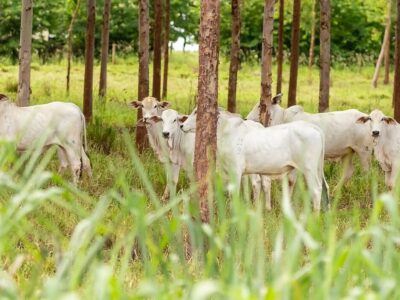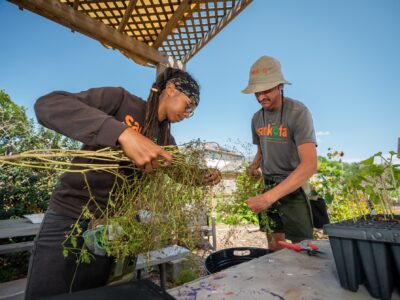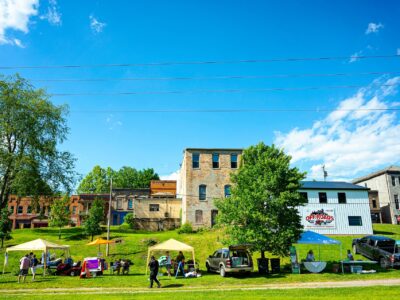Iowa clean energy technology company New Energy Blue has formed a new firm, New Energy Farmers LLC, to give joint ownership to Iowa farmers to supply sustainable feedstock to a biomass refinery. The New Energy Freedom Biomass Refinery will reduce carbon dioxide and improve soil quality. The groundbreaking refinery in Mason City, IA, is currently under construction and scheduled to begin operation in 2025.
There is no charge for farmers to become members of New Energy Farmers. However, each participant must commit to New Energy Farms’ sustainable goals.
New Energy Farmers will be responsible for providing clean, sustainable feedstock to the New Energy Freedom Biomass Refinery. The system was developed to ensure the massive supply of dry and clean bales of stover can be repurposed as sustainable biofuel. Stover is the leftover leaves and stalks of field crops like soybean and corn after the main crop is harvested.
New Energy tested its aggregation processes using equipment from John Deere, Holland, Case, and other major farm machinery manufacturers.
By chopping, stacking, and bailing excess stover, the program is able to turn those leftovers into cleaner, more sustainable fuel ethanol. According to a news release, New Energy Farmers is expected to provide a total of 275,000 dry tons of feedstock to the Freedom refinery after the fall harvests of 2024 and 2025.
Participating farmers will receive cash payments for every bale of clean stover removed from their acreage. The latest New Energy technology will increase the weight of stover bales from about 900 pounds to as much as 1500 pounds, cutting transportation and storage costs.
Photo Courtesy New Energy Farmers
“We’re tenaciously focused on every impact to our supply chain, from soil to product,” Thomas Corle, New Energy Blue CEO, said in a statement.
“For our first five U.S. refineries, we expect corn stalks to be the raw material for bio-based fuels and chemicals-replacing oil and gas refining in the future. We’re going into business with the American farmer, making a substantial investment.”
The sky is the limit on partnerships like these between farmers and the biomass refinery industry. Each improvement in the process helps farmers, who own and operate some of the largest swaths of American land, improve their soil, water, and air. The process helps in creating a sustainable, circular system critical to reducing carbon emissions and pollutants.
And there’s plenty of so-called fodder out there. The U.S. Department of Energy produces a “Billion-Ton Report” — the 2016 version is available, and the 2023 version is in draft — calculating the potential supply of available biomass in the U.S. available for fuel and chemical projects. Refineries like New Energy Blue’s facility are expected to create thousands of new jobs nationwide, put money in farmers’ pockets, and send millions of additional dollars through local and regional economies.
Photo Courtesy New Energy Farmers
“The great potential [of this] remains largely untapped,” Joe Ahrens, biomass strategist and logistics officer for New Energy Blue, said in a statement. “The reason is simple. Nobody up until now has developed a system that can aggregate this feedstock sustainably and cost-efficiently with minimal impact to the grain harvest.”





